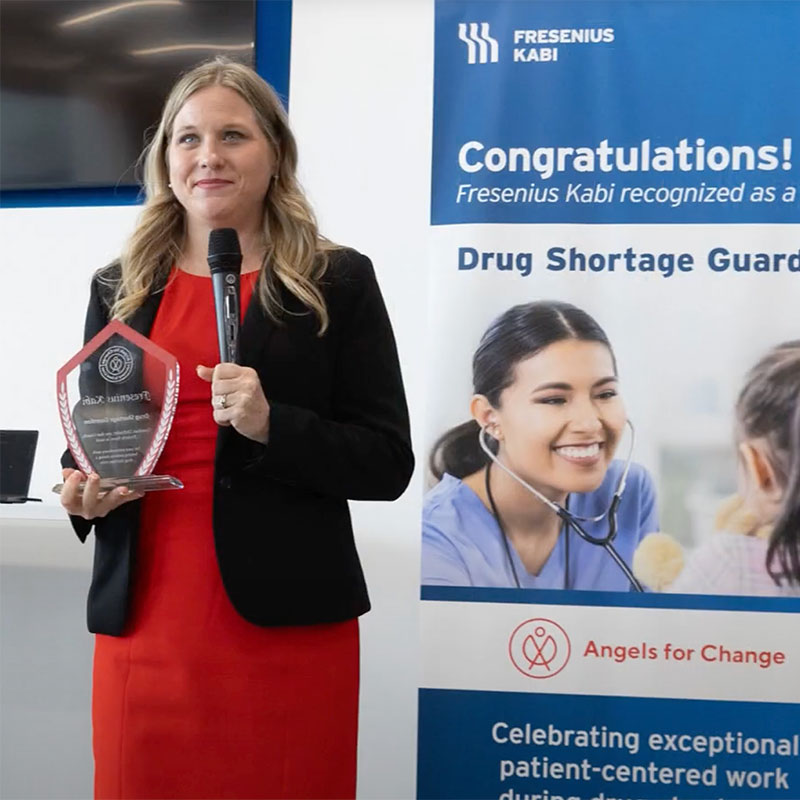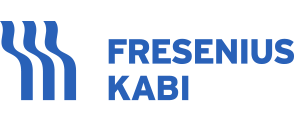What is one of the worst things a cancer patient can hear, after diagnosis? “The drug we need to treat your cancer is not available.”
Across the nation, critical oncology drugs are too often in short supply. While shortages are not exclusive to oncology medicines, delays in chemotherapy pose unique risks: patients need to get on and stay on specific drugs to treat their form of cancer. Any disruption in supply can mean delayed or missed treatments, or drug substitutions with less effective results or more side effects. This is not acceptable.
Fresenius Kabi is committed to helping end drug shortages. As the producer of the most comprehensive generic injectable oncology portfolio in the U.S., we’ve been producing and supplying oncology medications in America for more than 25 years. Our drugs are used in over 130 chemotherapy regimens.[1]
Why do shortages occur?
Precipitating events, like supply-chain disruptions, natural disasters, and quality issues, are almost always cited as the causes of drug shortages; however they represent symptoms of larger, more systemic, economic problems.[2] Among these are disruptive forces that undermine manufacturing predictability and drive prices below the cost to manufacture these drugs in the U.S. Offshoring where labor is less expensive, however, creates longer, more fragile supply chains that are less dependable and resilient – and this has led to difficult-to-remedy shortages.
The value proposition of generic oncology drugs has long served as a principal foundation for expanding access to life-saving care. The true cost of shortages to our health systems and patient care is great. Everyone in the industry needs to come together and take steps to create a more resilient supply.
The steps we are taking
Fresenius Kabi continues to be a leader in injectable drugs by improving reliability, making critical investments in automation and quality systems, building redundancies, operating new, geographically diverse distribution centers within the U.S. and leveraging technology tools to improve forecasting models.
In recent years, Fresenius Kabi has invested nearly $1 billion in upgrading, automating, and expanding our capacity in the U.S. As a result, more than 90% of our oncology drugs for the U.S. are formulated, filled, and packaged in the U.S.[3]
We multisource our APIs and key starting materials, establish critical manufacturing redundancies throughout our supply chain, and broaden our production and distribution to get products to patients faster. Because we understand the high stakes for cancer patients, we collaborate closely with our partners to mitigate any disruptions.
Working with government
Lawmakers are increasingly calling for action to address critical drug shortages. As more and more Congressional districts experience shortages, the chorus for reforms has grown.
Fresenius Kabi serves as a key policy resource to lawmakers and a proactive partner to stakeholders up and down the supply chain. As Congress weighs its options, we continue to emphasize the importance of finding comprehensive solutions. Solving drug shortages will require cooperation and shared responsibility across all major stakeholders in the supply chain.
Building a more resilient supply for these critical drugs starts with predictability. Working together, stakeholders across this critical supply chain can dramatically improve stewardship of these critical drugs by establishing a resiliency standard that emphasizes price and reliability in equal measure.
Fresenius Kabi urges lawmakers to prioritize utilization of existing domestic capacity as a stepwise approach before investing millions of dollars to onshore companies, build new facilities, or support start-ups. Comprehensive action by Congress and the Administration could establish greater predictability, improve underlying market dynamics, and create an environment that maximizes domestic production of these critical generic oncology products.
Working with advocacy groups, hospitals and oncology clinics
At Fresenius Kabi, we take our role in producing essential medicines very seriously. We work closely with industry partners and actively collaborate with supply chain stakeholders in forums such as the End Drug Shortages Alliance and in partnership with associations like the Association for Accessible Medicines (AAM) and the nonprofit organization Angels for Change (see box below) to bring awareness to the issues that cause drug shortages and to find solutions.

Fresenius Kabi Honored with Drug Shortage Guardian Award
Angels for Change, a global non-profit on a mission to end drug shortages, presented the organization’s 2024 Drug Shortage Guardian Award to Fresenius Kabi USA, a health care company that specializes in lifesaving medicines and technologies for infusion, transfusion, and clinical nutrition.
Fresenius Kabi USA received the award in recognition of its exceptional teamwork and patient focus during critical chemotherapy shortages. The patient-centric focus and culture of Fresenius Kabi enabled the company to rapidly increase output and urgently steward emergency supply to thousands of customers and patients in need of critical therapies.
Fresenius Kabi is also a past recipient of the FDA’s Drug Shortage Assistance Award. To learn more, visit: Angels for Change 2024 Drug Shortage Guardian Award.
For customers treating patients, communication is key. We keep in regular touch with the FDA and the ASHP on shortages throughout the industry so we can keep our customers informed. Every week we also update and publish our Product Availability Report at fresenius-kabi.com/us.
Our award-winning U.S.-based Customer Service team has trained personnel that answer calls live during our extended business hours and can also be contacted via email if preferred. Our customers can make a request in emergency situations for a direct shipment that will arrive within days. Our regional distribution centers are spread out across the country so that we are within 48 hours of delivering product to any customer in the contiguous United States.
No one can solve the issue of shortages alone, but at Fresenius Kabi, we are working night and day to supply customers with essential medicines when they need them. We will continue to work closely with lawmakers, industry leaders, patient advocacy groups and provider stakeholders to develop policies that support a robust and resilient supply chain.
[1] 2025 Data on file.
[2] Drug Shortages: Root Causes and Potential Solutions, A Report by the Drug Shortages Task Force, 2019 Executive Summary. Full version: http://www.fda.gov/media/131130/download
[3] 2023 Data on file.
